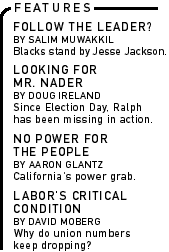

|

|

|

|
| |
 |
|
|
If we accept that unfettered corporate capitalism is a threat to democracy, then we are obliged to restructure our economy so it operates for the good of all people. To do so, we must first puncture the prevailing economic myths that erode democracy. Throughout history myths have served as ideological glue for popular perception. These false or unproven collective beliefs serve to justify certain social arrangements. For example, the Manifest Destiny myth of the limitless American frontier served both as a philosophy for the expansion of opportunity as America's immigrant population grew rapidly and as a justification for seizing the property of indigenous people. Myths simplify how people perceive the world, perniciously determining what people believe and what they do not. The myth of America as the cradle of constitutional democracy, for instance, flourished while slavery was an accepted practice. Integral to the prevailing philosophy of utopian capitalism is the myth of the self-regulating marketplace. In the ideology of corporate capitalism, the marketplace supposedly dictates the solution to all problems. If businesses are unsure what benefits to provide employees, they are told to follow the wisdom of the market. Such thinking has led to a dramatic increase in the use of temporary employees who lack both job security and benefits. If governments are in conflict over what public services to provide, they are told to privatize and let the market sort it out. In Great Britain this has led to the deterioration of a once splendid train system. This logic assumes that the market will solve each problem because it is operating as an objective, self-regulating economic force--part of the natural order in the universe of international economics. The fallacies in such an assumption are numerous. Because the marketplace operates under the limiting assumption that it exists to protect property rights, it conflicts with a concept of justice that places a greater value on human rights. Thus adhering to the law of the marketplace necessarily leads to actions that we view as unjust. For example, the decision to close a U.S. plant and lay off its workers so production can be moved overseas, where wages are lower, makes sense from the standpoint of the market. This decision doesn't make sense to those who would place a great value on the right of workers to have a job that pays a living wage, rather than the desire of corporate stockholders to expand their wallets. Further, the marketplace is not in fact self-regulating. Most economists agree that there must be central banks like the Federal Reserve to manage the international money supply. In many parts of the world, the operations of U.S. multinational corporations have long been protected by the U.S. military--hardly a natural mechanism. Further, some U.S. companies compete in the world marketplace with the help of government subsidies. One shining example is the export tax exemption that Congress passed in December, permitting companies like Boeing to avoid paying taxes on 15 to 30 percent of their export profits. Lastly, corporations are falsely asserted to be part of a natural order. In fact, corporations are artificial legal structures, and therefore should be subject to the control of the citizens of the countries that authorize them. The problem is that once a corporation (or a trade organization such as WTO) is authorized, they begin to act as if they had all the rights of an individual. They become difficult to control. (More about this in my next column.) Instead of accepting the myth of the self-regulating marketplace, we must strive to envision economics with a human face. Every aspect of the marketplace should be subject to common sense principles: Does this contribute to the common good? Does this organization promote true democracy? In my next column, I'll examine two more myths, the "corporation
as person" and the "level playing field."
|

